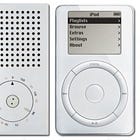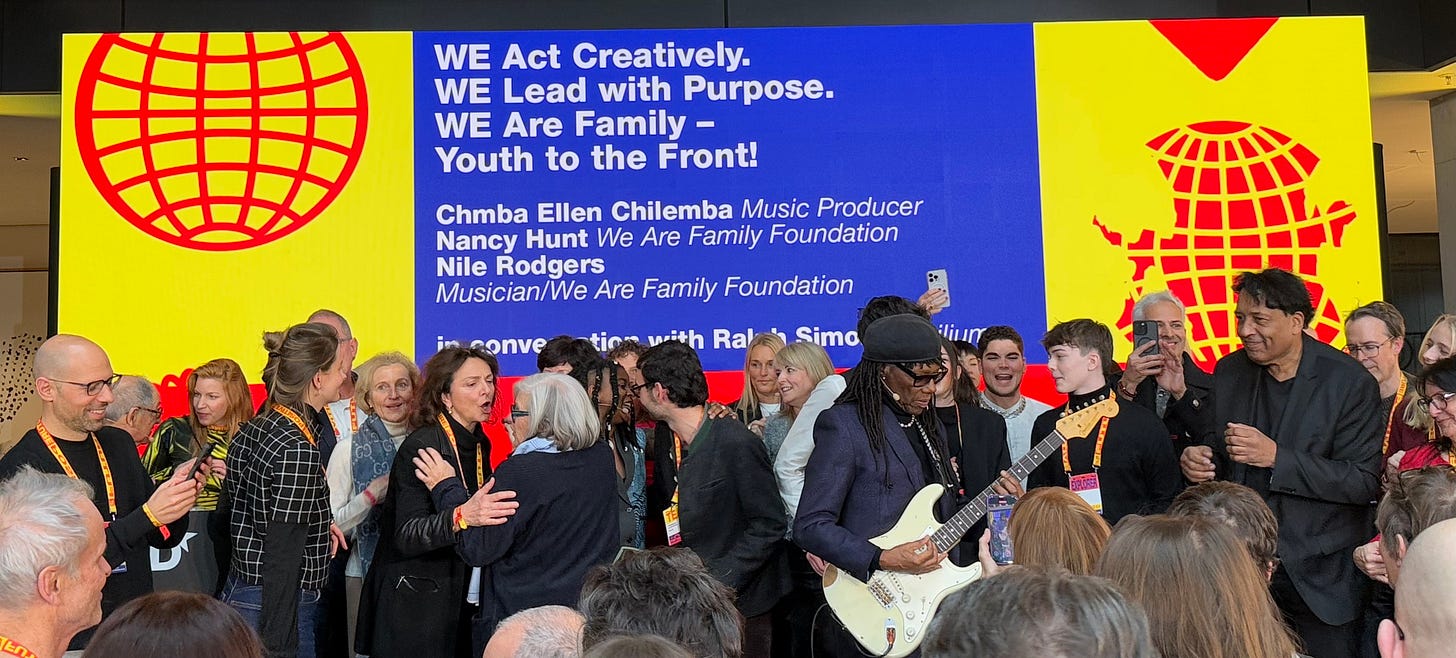You know how it is at conferences.
By the final day—especially those last few hours—you’re drained. The endless networking, back-to-back sessions, and excitement can leave you feeling like you’ve absorbed all you possibly can. Many people don’t even stick around until the very end. But I’m so glad I did at DLD Munich (thanks, Yossi Vardi, for the invitation!), because on Saturday, 14:00, the last session of the conference, that’s when I discovered Nile Rodgers—and it was worth every moment.
Like most people, I knew many of the legendary songs Nile Rodgers has produced—Get Lucky by Daft Punk, Let’s Dance by David Bowie, Like a Virgin by Madonna, Le Freak by his band Chic, and countless others. But I didn’t really know the person behind the music. And what a person he is! Even now, in his 70s, he embodies a rare combination of coolness and authenticity. It wasn’t just his career achievements that stood out (though he makes it sound like an everyday life story); it was his approach to creativity, life, and purpose that resonated most.
From the moment he started speaking, his childlike enthusiasm was contagious. I couldn’t stop smiling and laughing. His passion, joy, and effortless ability to connect with the audience made it feel like he was speaking to each of us individually. I remember thinking, "I just want to be this guy’s friend."
Then he introduced his philosophy on songwriting—something he calls Deep Hidden Meaning (DHM)—and everything clicked. According to Rodgers, every song starts from a real, nonfictional premise—an experience, feeling, or observation.
At its core, DHM is the truth behind the music—the message that gives it weight and longevity, even if parts are fictionalized. As Rodgers puts it:
If I don’t know what the song really means, how can I expect you to connect with it?
As Rodgers spoke about DHM as the emotional core of a great song, it resonated deeply with me. I’ve always believed that the most successful founders—like Steve Jobs, Walt Disney, and Edwin Land—understood this fundamental truth. They didn’t start with technology; they started with emotions, focusing on the human experience first. True innovation, in music or business, begins with something real—something deeply felt.
Watch Nile Rodgers talk at DLD Munich 2025
Rodgers put into words what I’ve long believed: meaning and authenticity must come first. Success isn’t just about technology, strategy, or even the product itself—it’s about starting with an emotional core and building everything around it. That’s why I believe certain founders embrace what I call business artistry—an approach where meaning and authenticity aren’t afterthoughts but the foundation of everything they create, just like in art.
Founders who embrace this mindset don’t just develop products; they craft experiences that connect on a human level. They begin with the people they serve—understanding their emotions, needs, and desires—and work backward, building everything outward from that core. Whether it’s a chart-topping song or a revolutionary app, the emotional foundation is what drives lasting impact.
Steve Jobs captured this perfectly when comparing the iPod to Microsoft’s Zune:
“The Zune was crappy because the people at Microsoft don’t really love music or art the way we do. We won because we personally love music. We made the iPod for ourselves…. If you don’t love something, you’re not going to go the extra mile, work the extra weekend, challenge the status quo as much.”
Now, authenticity is a business case, and it is echoed in consumer behavior today. A survey by Stackla in 2021 revealed that 88% of consumers consider authenticity a key factor when deciding which brands to support. In a 2023 interview with the Associated Press, Merriam-Webster’s editor-at-large, Peter Sokolowski, observed, “We see a kind of crisis of authenticity. What we realize is that when we question authenticity, we value it even more.” It’s no surprise, then, that Merriam-Webster’s 2023 Word of the Year was “authentic.”
This highlights a fundamental truth: successful founders don’t just chase the current trends; they pursue meaning. They create from a place of authenticity, ensuring their work reflects something real—something that speaks to people’s aspirations.
Too often, companies rush to launch new products without truly understanding their purpose. They focus on features and competition, overlooking the emotional core that makes a product truly resonate.
This idea of authenticity reminded me of Dieter Rams, the legendary designer I’ve written about before. One of his ten principles of good design states: “Good design is honest.”
Just as Nile Rodgers believes every song must have a Deep Hidden Meaning, Dieter Rams argues that products should be true to their purpose. Whether you’re creating music, designing products, or leading a team, the most inspiring work comes from a place of meaning—not just fulfilling a role. Authenticity matters more than hype or trends.
So, here’s a question worth considering: What’s your Deep Hidden Meaning?
If you don’t know what your work truly stands for, how can you expect others to connect with it?
After his talk, I wanted to tell Rodgers how much his message resonated with me. But he was surrounded by people (as you can see below), and I figured I’d missed my chance.
Then, life had a funny way of bringing things full circle.
Just before heading to the airport, my friend and I decided to grab a quick bite at the rooftop bar of the hotel. As we stepped onto the last floor, the city of Munich sprawled before us, bathed in the warm glow of the setting sun. The view was breathtaking—historic rooftops, church spires, and the soft hum of the city winding down beneath us. It felt like the perfect way to take in one last moment before leaving.
And then, there he was—Nile Rodgers. Standing at the bar with his partner and another guest, effortlessly cool yet completely approachable. The atmosphere was casual and easygoing, and for a moment, it felt like we were all just regular people unwinding after an eventful few days.
I finally had the chance to walk up and say what I’d been thinking all along: “You were amazing. You nailed it. Your authenticity, your energy—it’s inspiring. Thank you.”
He smiled, his eyes reflecting genuine warmth and friendship, and thanked me. At that moment, I realized that authenticity isn’t just something you bring to your work; it’s something you carry with you.
Rodgers has his own show on Apple Music show named “Deep Hidden Meaning Radio.” In it, he explores the creative process and inspiration behind famous songs. Be sure to check it out—I know I will.
Last Thoughts:
If you enjoy Business Artisty and think a friend or a colleague can benefit from it, tell them about it by sharing it.
I’d love to hear from you! Whether it's your thoughts, suggestions, critiques, or even cool stories and ideas, feel free to drop me a note at nir [at] theartian.com or use the comments.
Thanks for reading.
Nir
Just a heads-up: Some links might be Amazon affiliate links.





